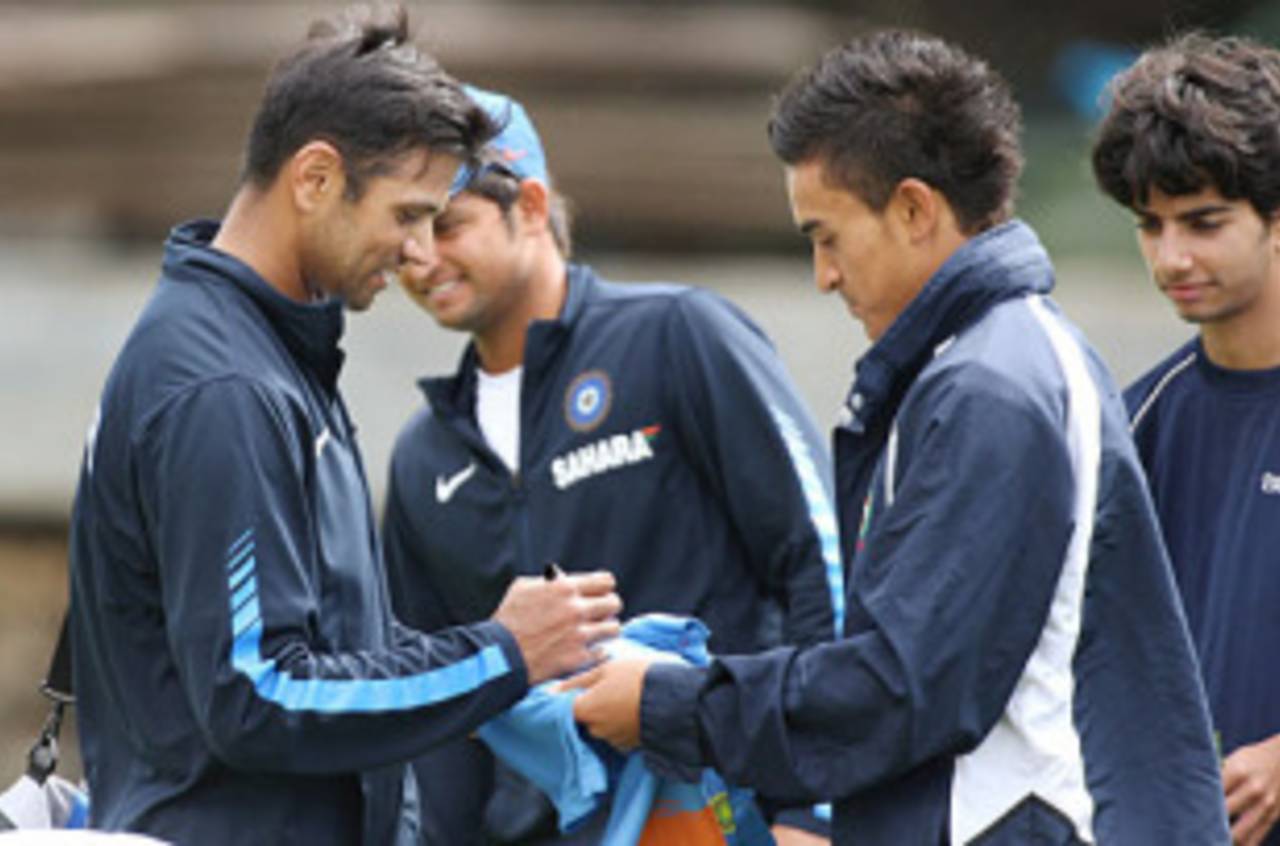What players owe their fans
Cricketers must realise that being likeable is important, and their followers should learn the limits of how much their fandom entitled them to
Harsha Bhogle
22-May-2010

Players like Dravid rarely earn the ire of fans because they remain polite and likeable all the time • AFP
At the checkout counter in our hotel in St Lucia, a lady came to say hello and ask politely if she could have a photograph. And then, in passing, she asked why "our cricketers" were so arrogant. "All I wanted was an autograph and a photograph for my kid, but they were so arrogant…" It wasn't the first time I had heard the line and I mumbled something about there being a lot of fans, but neither she nor I was convinced of my reply.
Meanwhile, in the bar of our hotel in Barbados, a loud, overbearing group of Indian fans was making it difficult for others to have conversations; not just because they were loud but because they kept interrupting everybody. As they got inebriated, and increasingly insufferable, they began to accost some of the West Indian cricketers. It was a good time to leave.
So here are two different images of the Indian fan. I have little doubt that the group the Indian cricketers encountered in St Lucia after their defeat belonged to the second category. But while people will do what they must, it raises interesting questions about the relationship between cricketers and fans. The cricketers believe fans are overbearing, the fans find them arrogant.
Many spectators and viewers believe - and this is a point often made in this column - that they are the genuine stakeholders of Indian cricket; that if they didn't watch, there would be no money, and maybe no game. The counter to that would be: what does buying a ticket or watching a game entitle you to? The action as a match unfolds? The excitement and drama that only live sport can provide? Or more? A slice of a player's life?
Conversely, are players expected to acknowledge that their livelihood comes, either directly or otherwise, from the people who watch them play? And that, therefore, they should be polite, dignified and likeable in their company? And very patient? But then, shouldn't fans be reasonable? Can't they wait, for example, before dinner is complete before barging in and insisting on a photograph?
I suspect, like with most things, both camps have a point. I do believe, though, that buying a ticket entitles you to no more than the action you have paid for. And like with the movies, sometimes you get to see a hit and sometimes a flop. I cannot, I'm afraid, subscribe to a view I have often heard: "We've come so far and look what they did." As if to say that because they have travelled the distance, the player is beholden to do well. I heard a lot of that in the West Indies. Sadly, it was often followed by derogatory remarks, inevitably unproven, about players and their habits.
In course of time, the love-hate relationship may extend to that between a player and the media. Aggressive, sometimes untruthful, reporting actually spurs the fans on, and I seriously fear large sections of the media are abdicating their responsibility towards being balanced and truthful
The players, too, need to realise that this is part of the deal they buy into when they enter the world of international sport. And that being polite doesn't cost too much. I have seen Tendulkar and Dravid and Kumble do it very well. Over time you know which fan to avoid, which one to smile at, which autograph to sign and when to pause for a photograph. Scribbling an autograph without even looking at a person, for example, is rude. It is far easier to say, "Sorry, but I'm in a hurry".
Unfortunately not many cricketers believe that being likeable is important. Sure, they are there to play cricket, to win matches and not popularity contests, but they also represent a team and a country. And I think they will discover that being likeable is not too difficult, nor bad for their brand value. All successful brands, and that includes people brands, eventually need to be likeable, and I hope someone tells our young cricketers that. Aamir and Shahrukh will always be bigger brands than Salman Khan because of the way they carry themselves. Ditto with Tendulkar and Dravid.
I suspect that, in course of time, this love-hate relationship will extend to that between a player and the media; especially if the media is as fickle and sensationalist as it has now become. Aggressive, sometimes untruthful, reporting actually spurs the fans on, and I fear large sections of the media are abdicating their responsibility towards being balanced and truthful, which is really a journalist's Hippocratic Oath.
To be honest I don't see a solution in sight. It could lie in educating the players of their responsibilities, in the media realising that ratings are fine for movies but dangerous for news, and in spectators not going overboard either way.
But I wouldn't bet on that happening.
Harsha Bhogle is a commentator, television presenter and writer